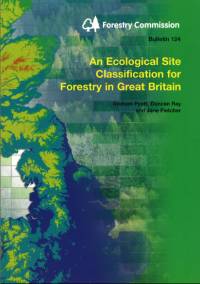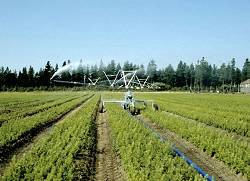Summary
Summary
With climate change now one of the greatest global challenges, research is underway to establish the likely impacts on all aspects of the environment. Information in these pages provides an initial description of the likely impacts on aspects of Scotland’s forest industry, with preliminary recommendations on how the industry might respond and adapt to the challenge.
About the information provided
Information has been compiled from knowledge within the forest scientific community.
In addition, spatial modelling, using the decision-support tool Ecological Site Classification (ESC), has been applied to future climate emissions scenario projections to examine likely changes in tree species suitability.
Maps are indicative and use coarse-resolution soil information with future climate variables derived from simulations provided by the United Kingdom Climate Impacts Programme (2002) (UKCIP02) at 5 km resolution. It is very important that the maps are used only to infer trends, and that forest planning for the future climate involves careful site- and stand-based consideration.
Publications and reports
Research Notes
- Impacts of climate change on forests in Scotland – a synopsis of spatial modelling research
By Duncan Ray.
Forestry Commission Research Note 101. - Potential impacts of drought and disease on forestry in Scotland
By Sarah Green and Duncan Ray.
Forestry Commission Research Note 4.
Reports
- Impacts of climate change on forests in Scotland – final report (PDF-1225K)
By Duncan Ray with sections drafted by Dave Wainhouse, Joan Webber and Barry Gardiner.
14th January 2008. - The evidence supporting the use of Continuous Cover Forestry in adapting Scotland’s forests to the risks of climate change (PDF-891K)
By Victoria Stokes and Gary Kerr.
October 2009.
Other publications
- Climate change and the future for broadleaved tree species in Britain
By M. Broadmeadow, D. Ray and C. Samuel.
Forestry 78:145-167. - Climate Change and British Woodland
By M. Broadmeadow and D. Ray.
Forestry Commission Information Note 69. - Climate change: Impact on UK Forests
Describes current thinking on the most likely effects of climate change on UK forests and woodlands. It is recommended reading for forest managers and advisers, students and all those with an interest in the consequences of global change to our forests.
Forestry Commission Bulletin 125.
Contact
For further information contact:
Funders and partners
![]()
![]()
This research is funded by the Forestry Commission Climate Change programme and Forestry Commission Scotland.
Forestry Commission policy
Forestry Commission policy on climate change stems from the UK Government’s response to the Kyoto Protocol with the publication of the strategic document on climate change: ‘Climate Change – the UK programme’ published in November 2000. The Forestry Commission and Northern Ireland Forest Service helped to produce this strategy and are responsible for ensuring that our forestry policies and practices allow UK woodlands to withstand the rigours of climate change.
The Scottish Forestry Strategy identifies climate change as the number one theme cross-cutting all other aspects of forestry. The strategy calls for a robust adaptation policy to prepare the industry to adjust and maintain or improve sustainable forest management.
Adapting Scotland’s forests to climate change – changes in tree species suitability
How the suitabilities were calculated
 The spatial implementation of Ecological Site Classification (ESC) has been amended to include future climate layers of accumulated temperature (AT), moisture deficit (MD), and wind exposure (DAMS) in a Geographical Information (GI) environment.
The spatial implementation of Ecological Site Classification (ESC) has been amended to include future climate layers of accumulated temperature (AT), moisture deficit (MD), and wind exposure (DAMS) in a Geographical Information (GI) environment.
In addition, the ESC model has been developed to couple MD and soil moisture regime (SMR) for the summer months. This allows the default values of summer SMR that have been assigned to major soil groups in the baseline climate, to be adjusted in the future climate.
The method for adjustment is based upon the relationship between available water capacity (AWC) and MD, published as Table 6 in Forestry Commission Bulletin 124 – An Ecological Site Classification for Forestry in Great Britain.
Data resolution
It is important that the suitability changes are not interpreted out of context. These are national analyses and should not be used for site or forest-scale planning. They give an indication of the regional trends in suitability. Decisions made at a site or forest block level must take account of the soil type and site conditions.
The model uses coarse resolution data: climate variable resolution is 5 km, and the soil quality data has been interpreted from the digital Soil Survey of Scotland Major Soil Sub-groups, published at a scale of 1:250,000 (Macaulay Institute).
Climatic averages and extremes
Suitability maps have been generated on average climate data. No account has been taken of the impact of extreme events on tree species, other than presenting the high emissions future scenarios as the worst case example. In 2008, we will have access to UKCIP08 climate simulations which are expected to improve our knowledge of the frequency and magnitude of extreme events, such as drought and winter rainfall.
Species suitability maps
Maps are displayed in a new window. File sizes average 40K and dimensions are 440 by 620 pixels.
| Species | 2050 low emissions | 2050 high emissions | 2080 low emissions | 2080 high emissions |
|---|---|---|---|---|
| Common alder | View map | View map | View map | View map |
| Ash | View map | View map | View map | View map |
| Beech | View map | View map | View map | View map |
| Corsican pine | View map | View map | View map | View map |
| Downy birch | View map | View map | View map | View map |
| Douglas fir | View map | View map | View map | View map |
| European larch | View map | View map | View map | View map |
| Japanese larch | View map | View map | View map | View map |
| Lodgepole pine | View map | View map | View map | View map |
| Norway spruce | View map | View map | View map | View map |
| Pedunculate oak | View map | View map | View map | View map |
| Silver birch | View map | View map | View map | View map |
| Sweet chestnut | View map | View map | View map | View map |
| Sessile oak | View map | View map | View map | View map |
| Scots pine | View map | View map | View map | View map |
| Sitka spruce | View map | View map | View map | View map |
| Sycamore | View map | View map | View map | View map |
Adapting Scotland’s forests to climate change – findings and recommendations
Key findings

More frequent green-spruce aphid attacks may reduce growth in eastern and southern Scotland.
(Photo: Clive Carter)
- The expected warmer climate will improve tree growth nationally, but particularly in southern and eastern Scotland. Productivity will increase generally, and this could be by 2 to 4 cubic metres per hectare per year (m3/ha/yr) for conifers on sites where water and nutrients are not limiting.
- The climate of southern and eastern Scotland will be more favourable for growing high-quality broadleaved trees on suitable deep, fertile soils.
- Droughty soils in eastern Scotland will become unfavourable for Sitka spruce and other drought-sensitive species.
- Changes in the seasonal distribution of rainfall will cause more frequent summer drought and more frequent winter flooding.
- Changes in the frequency of extreme winds will cause more wind damage. However wind scenarios have a high uncertainty attached.
- Pest and disease ecology will change with the climate; for example, more frequent green-spruce aphid attacks may reduce growth in eastern and southern Scotland.
- Scotland’s aspiration to expand woodland from 17% to 25% by 2050 provides an opportunity to target reforestation within habitat networks. This will reduce woodland fragmentation and thereby help improve the resilience of woodland ecosystems to climate change.
Emerging recommendations

Forest nurseries in eastern Scotland will have to adapt to the drier summers, for example by using more irrigation.
- Low-impact silvicultural systems (LISS) and the use of mixtures could provide the basis for adaptation strategies.
- Where other management regimes are used, a wider range of species and a broader range of genetic material within a species will increase stand resilience in a changing climate.
- Acceptance of natural colonisation of woodlands of non-native tree species may be a valid adaptation strategy, but this must be reviewed where conservation is a major objective.
- Forest nurseries in eastern Scotland will have to adapt to the drier summers (for example by using more irrigation) and to wetter winters (for example by avoiding soil damage).
- Contingency plans need to provide an adequate response to increasing risks of catastrophic wind damage, fire, and pest or disease outbreaks.
- The upper wind exposure limit, defined in terms of the detailed aspect method of scoring (DAMS), for productive conifer plantations may need to be reduced.
